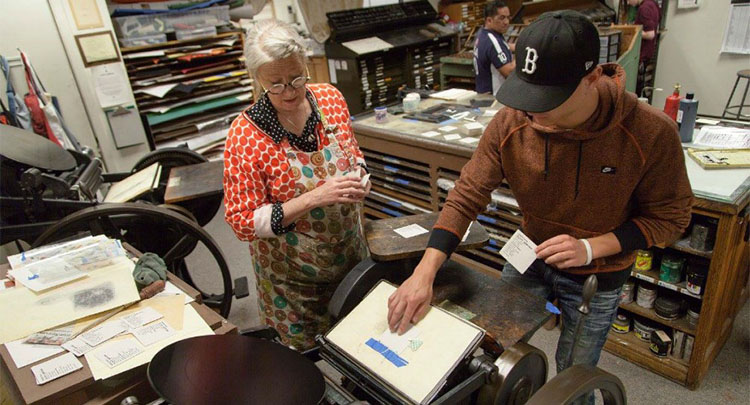Page 116 • (1,275 results in 0.062 seconds)
-
The Role of Computer Science in Liberal Arts Education & SocietyComputer Science integrates three fundamental processes: theory (from mathematics), abstraction (based on the scientific method), and design (from engineering) [1]. The problem solving perspectives emphasized in CS provide important mental models for addressing problems in many disciplines. This is sometimes called “algorithmic thinking” or “computational thinking.” As described by Walker et. al., “methodologies within computer
-

Discovery ‹ Resolute Online: Winter 2016 Home Features What Was/Is It Like To Be… The Call Design School Open to Interpretation Attaway Lutes Welcome Note Setting The Course On Campus Discovery Research Grants Accolades Lute Library Blogs Alumni News Homecoming 2016 Connection Events Lute Recruit Alumni Profiles Class Notes Family and Friends Mike Benson Submit a Class Note Calendar Highlights Home Features What Was/Is It Like To Be… The Call Design School Open to Interpretation Attaway Lutes
-
,playwriting,improvisation,technical,design,stage,lighting,drama,actor,thespian,improvisation,performance,perform Sociology Sociology Program Details major & minor Undergraduate College of Liberal Studies society,diversity,social justice,research,direct transfer agreement,transfer friendly,direct transfer,transfer,aa,dta,aa-dta Social Work Social Work Program Details major & minor Undergraduate College of Health Professions service,social justice,social worker,therapist,social services,counselor,case
-
for all B.A./B.F.A. majors. (4) ARTD 110 : Graphic Design 1 - CX An introduction to design through the study of basic techniques, color theory, and composition. (4) ARTD 180 : History of Western Art I - CX A survey tracing the development of Western art and architecture from prehistory to the end of the Middle Ages. (4) ARTD 181 : History of Western Art II - CX A survey of Western art and architecture from the Renaissance to the 20th century. (4) ARTD 201 : Drawing 2: Figure Drawing - CX Drawing
-
. Preparation for provision of quality cost-effective care, participation in the design and implementation of care, and assumption of the leadership role in managing resources. (3) (3 credits didactic) GNUR 527 : Evaluation & Outcomes Research Preparation for the critique and use of new knowledge to provide, change, and evaluate advanced nursing practice focused on client-centered, clinically-demonstrable care. (3) (3 credits didactic) GNUR 530 : Resource Management Management of resources in the planning
-
faced high volumes of pollution and degradation. Featured in the Parkland Ruralite were ways to help maintain healthy streams. 20222022 2020’sPLU still offers Environment 350 to Environmental Studies students. Throughout the course, students and faculty spend the semester researching different sites in the watershed through multiple disciplines: Ecology, Chemistry, Geology, English, Indigenous Studies, and more. .ctl-wrapper .cool-timeline-wrapper.ctl-vertical-wrapper.ctl-design-5 {--ctw-ybx-bg
-
, Media & Design Arts Committee Seat: Expires 2027 Contact: 253-535-8175
-
, and, together with the Governance Committee, helps to coordinate faculty governance.Faculty Executive Officers and Representative to the Board of RegentsName: Amy Young (youngam@plu.edu) – Chair of Faculty Department: Communication, Media and Design Arts Seat: Expires 2026 Contact: 253-536-5165 Name: Oksana Ezhokina (ejokinoa@plu.edu) – Vice Chair of Faculty Department: Music, Theatre & Dance Seat: Expires 2026 Contact: 253-535-7604 Name: Rick Barot (barotrp@plu.edu) – Secretary of
-

Add Edit Remove Back New Delete Publishing & Printing Arts Academic Programs all programs program website Publishing & Printing Arts Undergraduate Minor College of Liberal Studies It’s FREE to apply to PLU When you're ready, we're here. Apply now and fulfill your potential! Get Started Related Programs: Art & Design DISCOVER About Calendar Campus Map Land Acknowledgement Careers at PLU Lute Locker PLANNING Student Payments Textbooks Make a Gift Conference Planning RESOURCES Privacy Non
-
everything from copy editing and design to critical reporting and journalistic ethics. Outside the sessions, each of us conversed with student journalists from other universities across the country, exchanging advice and swapping newsroom stories. When we weren’t conferencing, we immersed ourselves in the city. We weaved through historic streets and roamed snow-covered Central Park. We posed with ancient Roman statues at the Metropolitan Museum of Art and stood face-to-face with Vincent van Gogh’s
Do you have any feedback for us? If so, feel free to use our Feedback Form.


